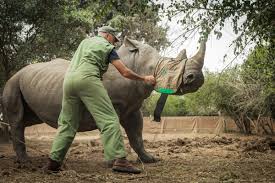Rwanda has successfully moved 70 southern white rhinos from South Africa to Akagera National Park in Eastern Province as part of a major wildlife conservation project. The move was jointly announced on Tuesday, June 10, by the Rwanda Development Board (RDB) and African Parks, the conservation group managing Akagera.
The translocation was carried out in two phases over three days and is seen as a big step for rhino conservation in Africa. The white rhinos were flown from South Africa to Kigali aboard a Boeing 747 cargo plane that arrived at Kigali International Airport on Monday, June 9. From there, they were carefully transported by road to their new home in Akagera National Park.
This large-scale animal transfer is part of African Parks’ broader “Rhino Rewild Initiative.” The initiative aims to reintroduce over 2,000 rhinos into safe and protected environments across Africa. The goal is to create several healthy populations of southern white rhinos to protect the species from extinction and to help restore natural ecosystems.
According to a joint statement from RDB and African Parks, the project reinforces Rwanda’s commitment to protecting endangered species and boosts the country’s status as an important player in global conservation. “This will ensure the establishment of several viable populations of southern white rhinos, thereby de-risking the future of the species and playing an important role in restoring ecosystems,” the statement said.
This is not the first time rhinos have been brought to Akagera. Back in 2021, African Parks moved 30 southern white rhinos to the park. That group has now grown to 41 animals. With the new 70 arrivals, Akagera will have one of the largest white rhino populations in East Africa.
The statement noted that these additional rhinos will help support “meta-populations” — separate groups of rhinos living in different protected areas but still part of a larger breeding and survival network. This method increases the chances of the species surviving in the wild, especially as threats like poaching and habitat loss continue to affect rhino populations across Africa.
The entire operation was funded by the Howard G. Buffett Foundation, a U.S.-based philanthropic organisation known for supporting conservation and development efforts in Africa. The foundation has worked with African Parks on other wildlife projects in the past and played a key role in making the logistics of this rhino transfer possible.
Officials say the rhinos are being closely monitored in Akagera to make sure they adapt well to their new environment. The park, which covers over 1,100 square kilometres, has become a model for successful wildlife management in Africa. It is home to the “Big Five” — lion, elephant, buffalo, leopard, and rhinoceros — and has seen a revival in tourism and biodiversity since African Parks took over its management in partnership with the Rwandan government.
Wildlife experts have praised Rwanda’s efforts, saying this kind of large-scale animal relocation is not only rare but also risky, requiring high levels of coordination, veterinary care, and long-term planning. The arrival of the new rhinos was the result of months of careful preparation, including health checks, habitat assessments, and transportation logistics.
The southern white rhino is the most numerous of the five rhino species, but it remains near-threatened due to poaching and loss of habitat. In some regions, rhinos are still killed for their horns, which are illegally sold in parts of Asia. Conservation groups say that relocating rhinos to safer places like Akagera can reduce the risk of poaching and help the species recover over time.
Rwanda’s success with wildlife conservation, especially in Akagera and Volcanoes National Park, has boosted the country’s tourism profile. Visitors now come from around the world to see mountain gorillas, elephants, lions, and increasingly, rhinos in their natural habitat. The government sees conservation not only as an environmental duty but also as a path to sustainable development and economic growth through eco-tourism.
The arrival of the 70 white rhinos marks one of the largest single translocations of the species in history and puts Rwanda at the forefront of African-led conservation efforts. It also strengthens Akagera’s reputation as a safe haven for endangered wildlife.
